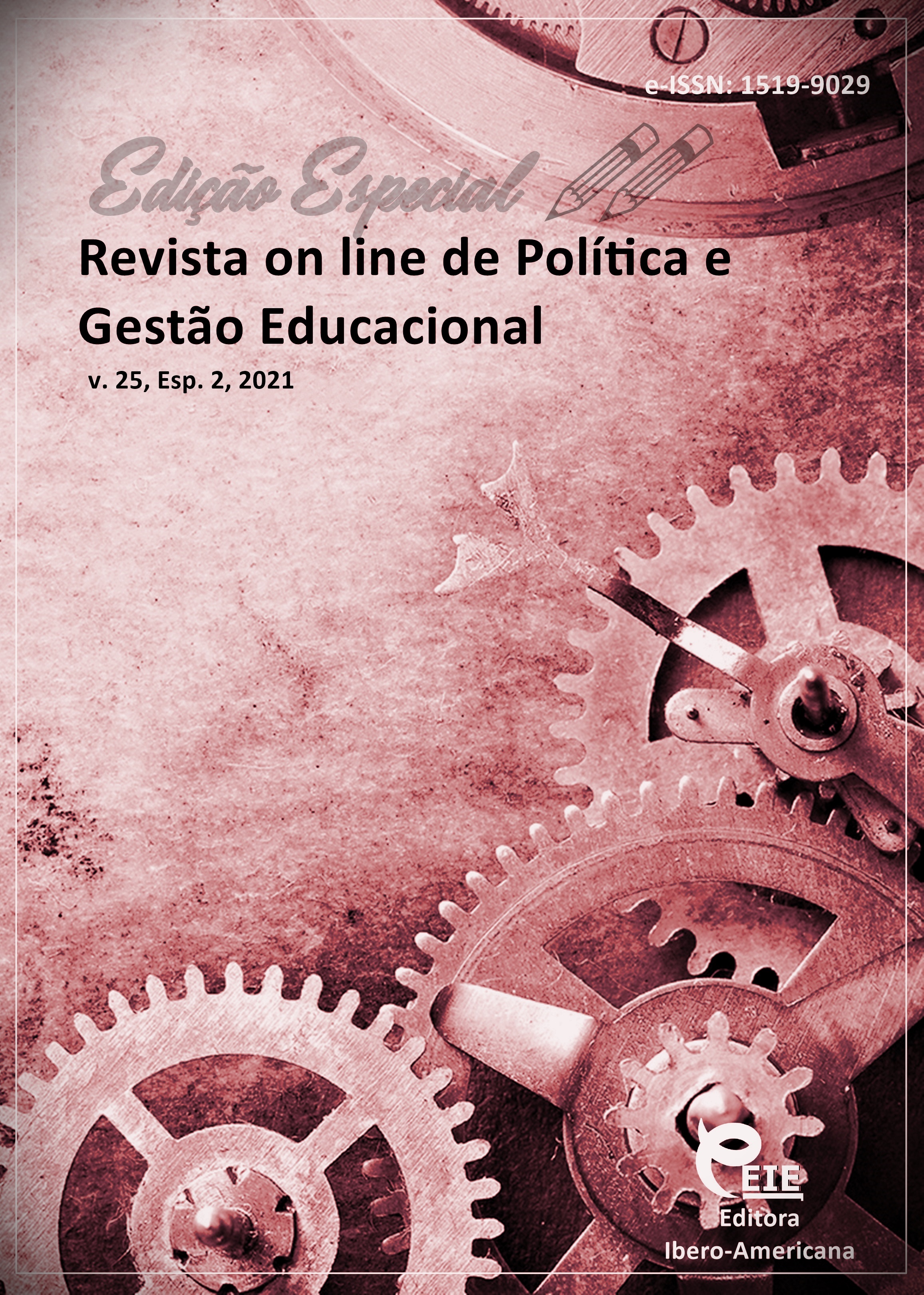Princípios metodológicos da organização do trabalho educacional das instituições de educação na realidade digital
DOI:
https://doi.org/10.22633/rpge.v25iesp.2.15279Palavras-chave:
Princípios metodológicos, Atividades educacionais, Nativos digitaisResumo
Neste artigo objetivamos problematizar os princípios metodológicos da organização do trabalho educacional das instituições de ensino no contexto das tendências modernas de uma sociedade em transformação. Os autores enfatizam a inconsistência e a multiplicidade de condições para o desenvolvimento mental e pessoal de uma pessoa no contexto da realidade digital. A adoção de documentos estratégicos que definem os rumos obrigatórios das atividades educacionais em todos os níveis de ensino requer uma compreensão das tradições existentes de ensino e educação. Os autores apontam para a insuficiente elaboração dos enquadramentos teóricos e metodológicos da educação das crianças da sociedade digital - “nativos digitais”, insuficiente análise da eficácia e eficiência das tecnologias e recursos educacionais digitais utilizados. O artigo apresenta uma visão fundamental da organização do trabalho educativo: como sistema e como atividade conjunta. Os autores estão convencidos de que para a organização da socialização dos membros da sociedade relativamente controlada socialmente, para a transmissão da cultura e das normas sociais, é necessário atualizar os princípios metodológicos da sistematização, o princípio ambiental, o princípio dos fundamentos comportamentais de valor, o princípio de produtibilidade, o princípio da inclusão de características individuais de idade e o princípio do envolvimento emocional.
Downloads
Referências
ASMOLOV, A. G.; GUSELTSEVA, M. S. Value sense of sociocultural modernization of education: from reforms to reformation. RSUH/RGGU Bulletin: Psychology. Pedagogics. Education Series, v. 1, p. 18-43, 2019.
BENINGHOF, A.M. Co-teaching that works: structures and strategies for maximizing student learning. San Francisco: Jossey-Bass, 2020.
BIESTA, G. Touching the soul? exploring an alternative outlook for philosophical work with children and young people. Childhood & Philosophy, v. 13, n. 28, p. 415-137, 2017.
BROD, G. generative learning: which strategies for what age? Educ Psychol Rev., 2020. DOI: https://doi.org/10.1007/s10648-020-09571-9
CONTAGE, G. D. Infância e invisibilidade: por uma pedagogia do oculto. Childhood & Philosophy, v. 15, p. 1-15, 2019. DOI: https://doi.org/10.12957/childphilo.2019.42877
DUGAROVA, T. T. et al. Self-identity of adolescents in the cross-cultural aspect (on the example of Mongolian and Russian adolescents). Journal of Environmental Treatment Techniques, v. 8, n. 4, p. 1599-1605, 2020.
HA LE, J. J.; WUBBELS, T. Collaborative learning practices: teacher and student perceived obstacles to effective student collaboration. Cambridge Journal of Education, v. 48, n. 1, p. 103-122, 2018.
KARABANOVA, O. A.; MALOFEEV, N. N. Education development strategy for children with disabilities: On the way to implementing a cultural-historical approach. Cultural-Historical Psychology, v. 15, n. 4, p. 89-99, 2019.
KOHAN, O.W.; KENNEDY, D. Gert Biesta and philosophical work with children. Childhood & Philosophy, v. 13, n. 28, p. 409-414, 2017. DOI: https://doi.org/10.12957/childphilo.2017.30504
MENDE, S.; PROSKE, A.; NARCISS, S. Individual preparation for collaborative learning: Systematic review and synthesis. Educational Psychologist, v. 56, n. 1, p. 29-53, 2021.
PEREIRA, S.; FILLOL, J.; MOURA, P. Young people learning from digital media outside of school: the informal meets the formal. Comunicar, v. 58, p. 41-50, 2019.
PEREIRA, S.; PONTE, C. E.; ELIAS, N. Children, youth and media: current perspectives. Comunicação e Sociedade, v. 37, p. 9-18, 2020
.
PRENSKY, M. Digital natives, digital immigrants. do they really think differently? On the Horizon, v. 9, n. 6, p. 1-6, 2001.
REAN, A. A. Psychology of studying personality. Moscow: Publishing house V.A. Mikhailov, 1999.
SALAKHOVA, V. B. et al. Informational and psychological safety of the educational environment in forming a person’s personality: current challenges and risks (ecological and psychological approach). Eurasia J Biosci, v. 13, p. 1797-1803, 2019.
SALAKHOVA, V. B. et al. The crisis of education in conditions of the covid-19 pandemic: The model of blended learning. Systematic Reviews in Pharmacy, v. 11, n. 12, p. 1411-1416, 2020.
SANTI, M. Collaborative problem-solving and citizenship education: a philosophical escape in the age of competencies. Childhood & Philosophy, v. 15, p. 1-19, 2019.
STRATEGY FOR THE EDUCATION DEVELOPMENT. Strategy for the Education Development in the Russian Federation for the period up to 2025. Moscow: Government of the Russian Federation, 2015.
TETZLAFF, L.; SCHMIEDEK, F.; BROD, G. Developing personalized education: a dynamic framework. Educational Psychology Review, 2020. DOI: https://doi.org/10.1007/s10648-020-09570-w
TURKLE, S. Alone together: why we expect more from technology and less from each other. New York: Basic Books, 2010.
VOISKUNSKII, A. E.; SOLDATOVA, G. U. Epidemic of Loneliness in a Digital Society: Hikikomori as a Cultural and Psychological Phenomenon. Konsul'tativnaya psikhologiya i psikhoterapiya. Counseling Psychology and Psychotherapy, v. 27, n. 3, p. 22-43, 2019.
Downloads
Publicado
Como Citar
Edição
Seção
Licença
Copyright (c) 2021 Revista on line de Política e Gestão Educacional

Este trabalho está licenciado sob uma licença Creative Commons Attribution-NonCommercial-ShareAlike 4.0 International License.
Manuscritos aceitos e publicados são de propriedade da Revista on line de Política e Gestão Educacional. É vedada a submissão integral ou parcial do manuscrito a qualquer outro periódico. A responsabilidade do conteúdo dos artigos é exclusiva dos autores. É vedada a tradução para outro idioma sem a autorização escrita do Editor ouvida a Comissão Editorial Científica.











